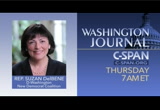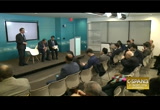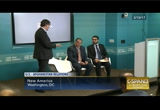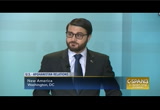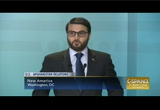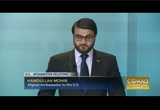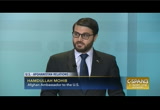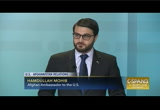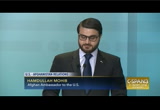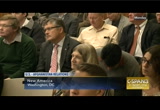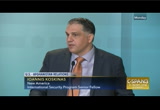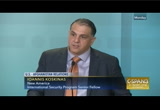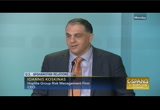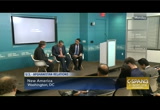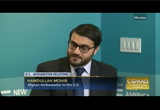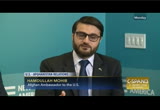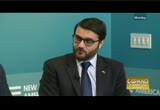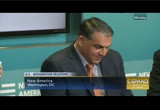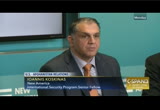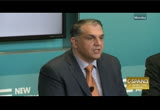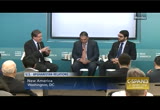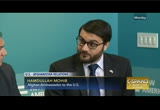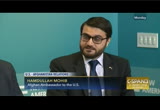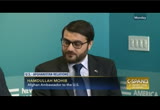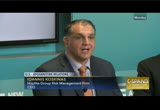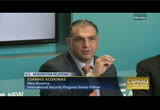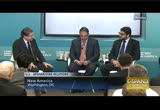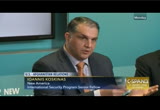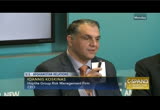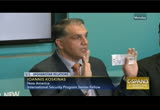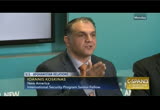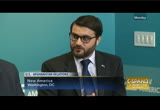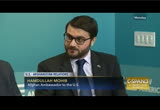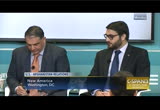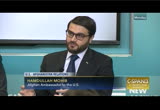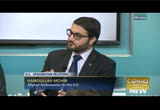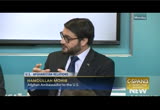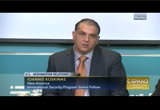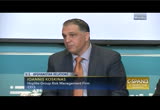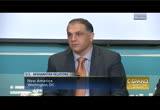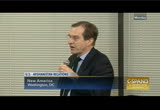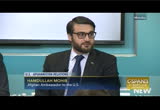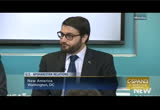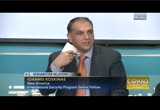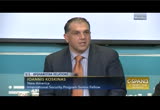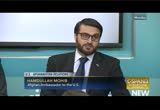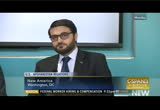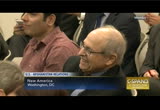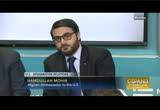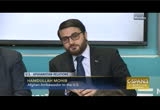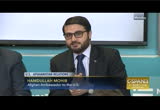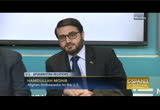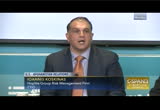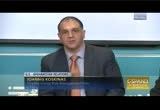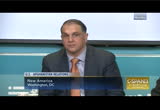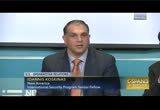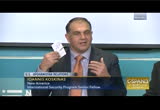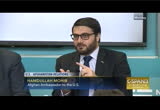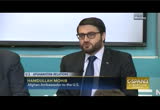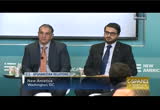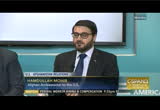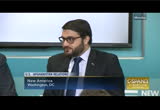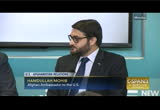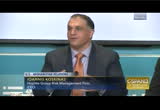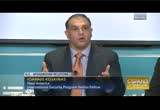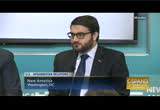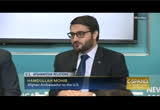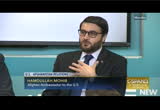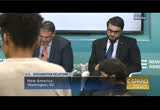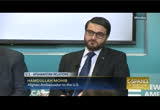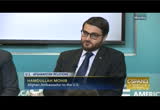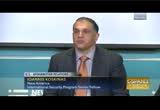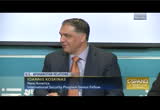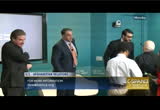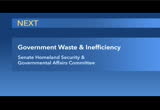tv Afghan Ambassador Hamdullah Mohib Discusses the Future of Afghanistan CSPAN February 15, 2017 6:43pm-8:03pm EST
6:43 pm
c-span's "washington journal" live every day with news and policy issues that impact you. coming up thursday morning, california republican congressman tom mcclintock will discuss contacts between trump campaign aides and russian intelligence, also budget issues and the future of the affordable care act and susan delbenin good will join us. watch "washington journal" live beginning at 7:00 eastern tuesday morning. join the discussion. at an event hosted by new america, afghanistan's ambassador talked about his country's relationship with the u.s. and efforts to defeat the taliban. this is an hour and 15 minutes.
6:44 pm
my name is peter bergen. i run the international security program here. welcome to you and also the people watching this on c-span. c-span is covering this live. when we get to the questions, please identify yourself and wait for the mic so the audience outside the room can hear your question. today we will discuss afghanistan 2017 and prospects
6:45 pm
for the future. we have two brilliant panelists to discuss that. first of all, the ambassador, who is the ambassador to the united states from afghanistan. he has previously worked as deputy chief of staff. he previously also worked at intel, at the american university in afghanistan. he's also a ph.d. from brunell university in the united kingdom and will speak first, then after that, yanni has been living in afghanistan pretty much since 2010. he runs a company which provides intelligence and security analysis to businesses in afghanistan. he's also doing his ph.d. at kings college about the afghan civil war. he's a retired army -- retired u.s. air force colonel in special operations who worked
6:46 pm
for stan mcchrystal in afghanistan. so over to you, ambassador. we look forward to your comments. >> thank you, peter and yanni. good to see you again. i'm glad to have this opportunity to join you to talk about afghanistan, where it is and where we're going, and what we expect from the new leadership here in washington. i want to begin by addressing something that i think is at the forefront of everyone's mind that's been following afghanistan and that is the testimony before congress last week by my good friend, general john nicholson. the big take-away from his comments was that militarily speaking, afghan and allied
6:47 pm
forces are in a quote unquote, stalemate with the enemy. i want to say something here about the national security forces, the afghan national security forces. the high level of casualties upon soldiers that we are taking is not a sign of weakness. it is evidence of their resolve to win the fight against terrorism, not just for afghanistan but also for the world. it is also a sign of the increase in the number of terrorist groups operating in our region and the advanced abilities they do have today. we are encouraged to see that the new administration is focusing on strategic goals rather than troop numbers alone and taking into account the military needs of the afghan national defense and security forces in terms of enabling. the national security reason that propelled the united states into afghanistan 16 years ago are as urgent as ever.
6:48 pm
perhaps more so with daesh increasingly asserting itself on our soil and the resurgence of al qaeda in both russia and iran's positioning on the taliban side of the equation. as ambassador, i get the same question a lot from people in washington here. are the taliban winning. is it true that they control more territory than at any time since they were ousted from power. i'm not going to exaggerate our victories, but that doesn't tell the whole story of what is happening. it requires a change in mentality from focusing on not losing the war to focusing on winning. in his testimony before congress, general nicholson also called for a holistic review of u.s. relations with pakistan. this is very encouraging to
6:49 pm
hear, because you cannot talk about the state of security in afghanistan without talking about the state of terrorists' havens and support provided by pakistan pakistan. the two are intrinsically interconnected. one is the cause, the other is the effect. until the u.s. takes meaningful action to sever that connection, our two countries prolonged and costly joint effort against terrorism in the region cannot succeed. this isn't a subjective opinion. this is an objective fact. victory required the paradigm shift in american thinking about pakistan. finally, i want to take -- talk about the trend line that is improving in afghanistan. i realize that our security situation tends to dominate washington thinking and that the steady drumbeat of attacks
6:50 pm
sometimes make it hard to see the good things that have happened since the current government was elected in late 2014. in all, we are making real progress in our very public, punish corruption, in 2014, when president rani took office our assessment of the government highlighted that corruption was an existential threat to the afghan government. it was made a priority of the new administration to bring about institutional and fiscal reforms. we have made much-needed progress since then. each so, you can't reverse decades of systematic endemic corruption in just 24 months or ena deeply engrained livelihood of poppy cultivation in that short amount of time. in the attention those problems receive tend to obscure progress in other equally important areas.
6:51 pm
but president rani's road map to self relyians is moving us in the right direct. support to the government's reform agenda must also become an international priority. what we are telling our american partners, and what i told president trump when i had a moment of his time recently, is that the groundwork has been laid for afghanistan to emerge from years of war and poverty. the hard work has been done. we have democratic institutions, constitution that guarantees our citizens equal and human rights a leader who is committed to good governance, accountability, education for all, and jobs opportunities. and perhaps most importantly for afghanistan's allies and partners, in addition to being committed to waging peace, we are committed to ending our dependence on the international community.
6:52 pm
we're closer than ever before to self relyians and stability. it is our people's utmost desire. we see the light at the end of the tunnel. the tunnel is still long, no doubt about that. but the light wasn't there just a couple of years ago. and we can't afford to let it go now. thank you. [ applause ] >> thank you, sir. i'll keep my -- i'll keep my comments very short. i think that with such a big audience, questions are probably more appropriate to take us in different directions than the comments. but i will echo this. i went to afghanistan my first time in 2005. and i felt like i was late to the game in 2005. but, certainly, it got in me, and i have stayed there ever since. i left the military in 2011 after spending a couple of years
6:53 pm
in afghanistan working for general mccrystal twice. and i had a chance of working with then dr. gani, and one of the academics and enlightened people who had come back to afghanistan to really make a difference. spending a lot of time with dr. gani at the time, a couple times a week, several hours, for about almost ten months was -- was actually one of the thing that raised my awareness about how little i knew about afghanistan. and in any regards it made me commit myself to a lot of things later. in fact, dr. gani actually pinned on my eagles -- my colonel rank when i was promoted to that. and he made the trip just for that to the states at a time when, you know, quite frankly, money was probably tight because he was doing a lot of things on his own.
6:54 pm
so i appreciated what happened then. and i mentioned this little vignette only so far to tell you that i -- he was a big reason -- one of the reasons why i stayed in afghanistan. but in a lot of ways, the people of afghanistan have been the reason why i've remained. and they are a willing partner for us. they are actually very much in tune with the idea of an american involvement in the region and stabilizing of the region that's actually facing some serious issues with fundamentalism. but i'll tell you that, that i don't think we've done enough on our end. i'm not saying that we haven't spent enough. we certainly v. i'm not saying that we haven't sacrificed enough. i think we have. i've been to plenty of funerals and ceremonies in lot 60 in arlington to tell you that certainly our blood has been spilled and our money has been spent.
6:55 pm
the trouble is that i don't think we have ever considered return on investment as a prior -- as a priority in the way that we approach afghanistan. we have used burn rate. you know, if we spend x amount of money, obviously, we're doing something. we've used numbers in terms of troops. but in terms of the way that we approach things, we certainly haven't used, you know, return on investment actually as part of our commitment. so i hope that we talk about some of this stuff in our question-and-answer session. but i'll tell you that every day that i'm in afghanistan i'm reminded that, you know, our commitment can't be one year at a time. our support there cannot be very veneer and surface. conditions matter. timelines don't. and i think that we owe a lot more both to the people who have sacrificed a lot from
6:56 pm
afghanistan, but also from our troops and civilians to actually try to win. exactlyu what you said, rather than not lose. and quite frankly, we also need to talk about staying rather than talk about not leaving. with that, i appreciate the opportunity to speak and thank you for having me, peter. [ applause ] >> so how would you characterize the state of play in the taliban right now. what the united states generally says is that the taliban controls or contests a third of the population of afghanistan. do you think that's more or less accurate right now? >> well what is talked about not the population it's mostly the territory and what we start to pay attention to is where those
6:57 pm
tactical wars have been leading in the since 2014 when the international troops withdrew they also took their air power capabilities with with them. the afghanistan skpurt forces to this day do not have the adequate air power necessary to be able to disrupt larger taliban attack. so what they were to do in the past was small attacks in a small number of groups because the airpower disrupted them w. that capability gone, they have the ability to be able to launch major attacks. they were not able to sustain it. they could launch a major attack, disrupt an area, a district, and then not be able to sustain it because the afghan security forces would move in and take it back. so we have been tested, and there are serious challenges that we need to address. but the focus here needs to be on how do we make sure that this -- that this capability is added to the afghan security
6:58 pm
forces so that those attacks could be -- corps marginalized? in the past we had smaller groups, smaller units that manned a small check post. and once the number of attackers became in the numbers 200 instead of being six, this small check post was no longer enough so we had to retreat, into bigger units so we could launch offensives. that's taken as an attitude of taliban controlling territory. they are not really controlling territory. it's just that we no longer man it. we are doing this in an offensive capability. >> what sort of manpower are you talking about that theafter began military needs? >> close air support, helicopters, that's a must in the kind of terrain that we are fighting. it's also a must so that we have eyes on the battleground ahead of us. today, the afghan security
6:59 pm
forces when they fight, and without the close air support and the isr capabilities that are needed the taliban are at an advantage because we are wearing a uniform where they are not. so they can hit us, identify us, easier than we can because they could disguise themselves as civil yans. >> didn't the obama administration change some of the rules of engagement around close air support readily towards the end? >> they have, but there is no replacement for the afghan security forces having their own capabilities for those offensives. >> specifically -- when you say helicopters, what -- what are you talking about? >> well, combat helicopters. we are looking for come bats force. and also we are looking for enablers and meddy vac capabilities to be able to get air and lift. a lot of the casualties that we have had over the past year have been during transport. not on the battlefield, during transport, our security forces
7:00 pm
willing transported in soft vehicles that came under attack, land mines and a what they have today those mag kneltic bombs that are attached to it that ended up caution us the most casualties. air lift is an important factor to reduce that number. it also gives us the eyes and the ears and also gives us the capability to disrupt larger units from attacking district centers. >> you are a korea air force officer. do you share this assessment? >> actually, i was listening and saying what do i add to that? there isn't that much i can say. i think that's a perfect assessment. the one thing i would add, though, is that -- well two things, actually. one, airpower takes long time for it to reach, you know, to reach its potential. whereas you may train ground troops in six, seven weeks or you can, you know, specialize them in a few months, get them
7:01 pm
each more, you know, seasoned over year. it may actually take a year-plus, to get a pilot trained. it may take a year-plus to you know, orient somebody to a particular airplane. look, for example, general nicholson mentioned in his testimony that there are u.s. helicopters that are being considered to to afghanistan. but the process of getting these helicopters there may take up to two years. so when you are looking at these, the long lead time for the airpower has been part of the problem. anybody who has been in afghanistan, you know, during ten, 11, 12 -- you start looking at, you know, bulldozered airplanes over to one side of the air field because we picked the wrong airplanes and then we sold them for scrap for a few cents on the dollar. so these mistakes are costly when you are looking at how you are able to project airpower in
7:02 pm
the long run. and if i may, one more thing about this is that the trends are something we can't deny. when somebody says, you know, how did we do in comparison 2015 to 2016, the numbers come out rather quickly. but as ambassador mentioned context matters. these trends are not just a figure that lays out there by itself. it has to be put in context. and even the number -- excuse me -- even the number of districts or centers or population centers that the afghan government controls, even those are troubling. you know? so we have to look at the context that he's mentioning. percentages are, you know, like an old friend of line used to say, about 74% of statistics lie. so, those are something that you know, you should take stock of.
7:03 pm
>> ambassador, you mentioned pakistan. you are a diplomat, but what -- you know, what would you say -- you mentioned that the administration might be taking look at the relationship with pakistan. i mean, what is your assessment? of course anybody who spent any time in afghanistan knows that most people say if only pakistan would stop harboring these groups our problems would be over. is that a reasonable -- mean that seems simplistic to me. what is the role of pakistan? is it getting better? worse? how would you assess it? >> well, every neighbor can play two roles, in this case, either a spoiler or can remain neutral if not helpful. in this case it is an active spoiler in afghanistan. being able to provide sanctuaries, support to -- we have witnessed at least in the past two years if we are not
7:04 pm
going too far behind, we have noticed that the pakistani leadership travel and their pakistani passports, they are provided with hospital and medical support. >> when you say pakistani leadership, you mean the taliban leadership. >> no. >> afghan. >> afghan taliban leadership in pakistan that travel under pakistani passport. those things come out. they cannot be hidden. >> yeah. >> we saw where the head of al qaeda was. and those things highlight quite a few important factors. that is this is -- the shift of making it sound like it is a blame game has now -- is no longer viable. this is objective facts. all of those things have happened, and they have all happened in the recent past. so they cannot be forgotten so quickly. if pakistan wants to -- i think
7:05 pm
wants to save itself -- what we are worried about is that it affects pakistan's future itself. those terrorists do not recognize those boundaries as restrictions to them and would soon turn their own weapons on pakistan. so what is happening to us today can become the future of pakistan. for that reason as well, i think it's -- for the pakistani administration to assist us in eliminating the terrorists from that region. and sincerely assist. not just say and talk about it. we need to see some actions. we have always had some good words from pakistan. it continue to be the case. they speak about -- about cooperation, and they always have very good ways and words to put it in. it's just that it never materializes in action. and that's something we would -- >> well, i mean the pakistanis
7:06 pm
did do a major provision in the north, right? >> yeah, they did. they did. >> but on element that they considered a threat to themselves. >> right. >> not a threat to afghanistan or to the region. this is where i think that distinction becomes -- i think the issue. that's why we are focused on do not distinguish between terrorists. it's not -- whether they are our enemies today, they will soon turn and become your enemies tomorrow. let's look at this from more strategic objectives. and if pakistan wants to be able to make a good friend out of afghanistan, this is not the way forward. this is not the way to create influence in a country. >> what about isis? go ahead, i didn't want to cut you off. >> thanks. the one thing i would say about pakistan is a lot of people want to group afghanistan and pakistan together. the reality is that we have to look at them for their own
7:07 pm
interests, for their own personal -- for their own national agendas. and where we don't want to have conflict from an american perspective is when it's conflicting with our national interests. and when we're talking about fundamentalism or the operation that they held in the north, obviously, it was a significant event because they dealt with their own, you know, terrorism problem along their borders. the problem is when you are looking at our national interests is that they also bulldozered over a lot of, you know, elements into afghanistan which obviously caused a ripple that we saw in 2015 and '16 that we're still dealing with n. some ways they displaced the low level sanctuaries inside the north and put them in place as sanctuaries in some places like
7:08 pm
that we mentioned earlier. the percentages are, you know, that they control some territory. so when you are looking at those things, you actually have to put, again, put it in context. a holistic review of pakistan should be a holistic review as it relates to our national interests. and what i mentioned is, it's contrary to our national interests what is going on there. their behavior is contrary to our national interests when it comes to our people getting blown up. when you actually map out where some things came into afghanistan from, whether it's ieds or whether it's funneling of personnel or whether it's kidnapped victims going out to the trouble areas, there is a connection with a lot of the stuff that goes on in pakistan,
7:09 pm
my trouble is that, again, we tend to not understand the dynamics of the region so we just group things together. we formulate what we believe is a joint sort of effort, how to counter problems together but in reality we just turn the page and just not really address anything. >> so isis is that a problem in afghanistan getting bigger, smaller? a problem in al qaeda getting bigger or small? >> we've been able to target isis because of the, again, the rules of engagement with the resolute support. we had the capabilities to launch several offensive attacks. we have seriously disrupted the operations of isis and their strong holds there but they still exist and with cannot underestimate what they can
7:10 pm
continue to do if we -- if we die vert our attention to the time being. we're able to contain them and because we're focusing on it. >> is there any evidence of people from isis leaving syria and iraq and moving to pakistan. >> i think what you're talking about is dozens, if it, in fact, is happening. so i would answer the question slightly different, with a different perspective. we talked about a little bit of pakistan but when you talk about isis, there's a pakistani element to it. they all started from that side and migrated into afghanistan. a lot of them are pakistani and they've created some -- they've established a base and controlled multiple districts but in reality, you know, that is not a ground -- it's not an
7:11 pm
element that's native to afghanistan, if you will. the taliban on the other hand are. and so what we're looking at in 2016 is from '16 to '17 we can't tackle the problem in '17 as we did in '16 because it wasn't that successful. we did put some pressure on them, but they were still able to create a attacks in ca bell and elsewhere that killed hundreds of people and actually fermented some ethnic descent. if anything you give credit to the society in afghanistan that it did not react violently to those things. but i will tell you this and this is actually going back to your previous question, when you're looking at holistic approaches we're also not taking holistic approaches to afghanistan. new administration so we have to give him a little bit of time, but there is a stand-in
7:12 pm
ambassador there. there is -- we lost the ambassador as state department that dealt with afghanistan/pakistan issues. nobody is actually at the pentagon or with any level of authority or quite frankly -- as it happens with every administration they turnover so we don't have anybody there so when generally nicholson is at the hearing and somebody asks him with 300 troops going, he says that's not my area. counter narcotics is not what i deal with. fair enough. we need somebody to mention about narcotics but that's a big deal when you're going into the highest percentage of opium producing. you have to think about how we approach this. then we talk about should the taliban be labeled a terrorist group. okay. just let's -- i'm not the
7:13 pm
diplomat, i'll say yes. a 100%, the taliban are a terrorist groups, they've been behaving in terrorististic activities. they should have been labeled years ago. if we keep them off the list somehow they'll want to talk reconciliation more is about as naive as i can possibly imagine, but not that i'm upset about it, but the point is, when general nicholson has asked that he also can't give an answer because there's nobody at state that could possibly answer that thing. we have to have a holistic approach and review, not just in pakistan but also in afghanistan because we can't expect the brave troops that have been taking so many risks, our folks that are taking so many risks albeit not as much as the
7:14 pm
afghans, you can't expect them to go into battle with uncertainty of where are we going with this in 2017. so i'm enlightened -- i'm embowledened in some way that we're going through this journey right now where it's no longer what about leaving, but we have a lot of work to do. a lot of work to do. >> can i add one thing to this movement part? >> the movement part, the narcotic trade creates a smuggling group, and this is not just used for the smuggling of heroin. it is also used for human trafficking, for weapons smuggling. so whether people are moving in one direction or another, they're using the same routes and same networks that are providing that capability and once again it becomes an important area to focus on because it is not only providing funding to the terrorists, it is
7:15 pm
also providing access to them to be able to move fighters along and have that human smuggling coming on. >> reconciliation, peace talks with the taliban, is anything happening or what are the prospects? >> well, the afghan government has always had this chance for reconciliation with those elements of the taliban that would like to and are afghans and consider afghan priorities are open, our doors are always open to them. that's -- but we have to at the same time defend our population from these attacks. you saw the number of civilians that have been targeted over the past -- just this past week alone. that's not acceptable. >> opening it up for questions, if you have questions, wait for the mike and identify yourself. we'll begin with christina lamb with the sunday times. where is the mike?
7:16 pm
christina is here in the front. >> yeah, i just want to ask you, on reconciliation, i mean, given the progress that the taliban have been making militarily, is it realistic actually to defeat the taliban or does there have to be reconciliation? and i wondered what your views are on the russian initiative to have the peace talks. >> as i said in my comments earlier, the -- we need a shift in mentality from not losing to winning. and we must -- we have to win in afghanistan. you don't win in afghanistan. we don't win in afghanistan means insurgents across the world will get emboldened, and be given the opportunity to consider that they can bring down legitimate government and
7:17 pm
terrorize the world. so it is not a question of whether, it is a question of whether we must do that. and, yes, the capabilities exist and we can defeat the terrorists in afghanistan, and those are -- there are a few ways to -- there are a few things we need to do going from what we have already been doing and that is increase the capability, the afghan security forces, which we are, there is a strategy for the next four years, to be able to increase the units that are -- that we use in offensive operations, increase our intelligence cooperation among the internal -- so this they can target the enemy much more precisely. and at the same time, disrupt their channels of funding and other sources that are coming that requires diplomatic effort, where we need the international community support in putting the
7:18 pm
kind of pressure that is necessary on the -- on pakistan to be able to eliminate those safe havens, but also to come up with ways together to end those sanctuaries. what we were talking about is the conditions earlier. if we're talking about troop numbers, we're missing the point. what we need to be able to address is what is it that we want to achieve in afghanistan and that goal should be the -- the right answer would be we want to win against the terrorists. we want to bring stability to a country that has been at war for close to 40 years. and once we have -- once we have achieved -- once we have come to that conclusion, we need to set what are the targets and what are the responsibilities of the afghan government, the afghan security forces, the international community, and our neighbors to be able to achieve that goal. so that we create a positive consensus. instead of trying to -- instead
7:19 pm
of our neighbors being busy trying to convince russia that they need to support the taliban, they need to be paying an active role in defeating the terrorists that are killing the afghan people. and -- >> when you say the russians are supporting the taliban, what do you mean? >> we're not supporting publicly, we have seen some rhetoric about taliban being able to or at least any kind of talk with the taliban that gives them any kind of legitimacy. that can not be -- that beats the point. our goal in the international community's goal, entire world gold, should be to beat terrorism in that region. only way to do that is to legitimate sources of the people, the elected government of the people that can be -- so any kind of support provided in ending terrorism must be channeled through the afghan government. >> okay. so russia, russian freelancing, what are you specifically referring to here? >> any country that has -- that perhaps makes notions that there may be an alternative i think
7:20 pm
makes -- makes that point later. >> i think in some ways russia would be probably interested in containing the taliban issue in a place like afghanistan so it didn't spread into uzbekistan or some of the other areas that were formerly in their control, controlled with islamic fundamentalism, you know, coming in from the south, into their territories. so -- but in the end, there is not that much that they're doing. and in afghanistan. another aspect of it, that i think is -- to answer your question, if i may, the reconciliation is the thing that we sort of kept out there, you know, in case it catches. and, of course, it has to be out there, you always want to have that dialogue open, you want to have that -- the ability to do that. and the afghan government has been open minded.
7:21 pm
my approach to it, however, looks at it again from return on investment. we spent a lot of money on it. we put a lot of stock in some of these activities. and both in time, bandwidth and money. and it just hasn't yielded anything. so the idea of continuing down that path with zero chance of it materializing, again, i'll keep it open, i would recommend that they would, but, again, i don't put that much emphasis on it. the last thing i would say is all roads don't go through islamabad. so when you're looking at peace negotiations, the idea that somehow you don't have them in a neutral place, whether it is switzerland or wherever, you know, and you have them in islamabad, to me that's just naive. and from my -- again, i use the word naive, not because it is not well intentioned, it is just that nobody paid attention to the fact that, hey, we had the peshawar reports, that was back
7:22 pm
in the day when we were dealing with another sort of reconciliation effort. and it failed. because people have their own national interests at play. it is not about afghanistan if it is being held in islamabad. i'm sorry. that's just not there. so reconciliation is a good idea. i hope it eventually happens. it is the only way that these things sort of end. but they linger for a while. and i don't want to spend any time on something that quite frankly is not bearing any fruit. [ inaudible ] just like they're doing in syria, just like they're doing in a lot of places and most of it is to give us a black eye more so than have any sort of result. >> i agree with what i take from all of the panelists, a sense
7:23 pm
that -- that the u.s. needs to re-examine its policy toward pakistan as part of a -- the way forward. if you had a chance to talk to the current administration, as it starts to get its act together on this issue, how should the policy change? what are the pressure points? all these -- all these -- all this blood and treasure that has been expended and many efforts have been made to convince the pakistanis that this policy of harboring taliban leadership is not in their interests, they continue to do it anyway. where are the pressure points? how can you get -- how can the u.s. get to a policy that might bring change in this area? thanks. >> we have a list of activities that we would like to share with them. on what can be done, that is with evidence. but it is also in the interest of pakistan as we were -- i was alluding to earlier that we end terrorism. it is hurting pakistan more than -- in their future, their
7:24 pm
economic future, than it is right now. the damage that was done in afghanistan is pretty much -- it can only go positive now. but where as it is going to impact pakistan and we would like to see a peaceful and stable pakistan because it is also in our interests. our neighbor in that region of conflict is something we would like to avoid. we have seen it. we have witnessed what conflict does to our country and what it does to its neighborhood. and we do not wish it on anyone for that matter. so we have practical recommendations for both the u.s. government and also for pakistan on what needs to be done. it is also impacting in the illegal economy that we were talking about that those illegal roots, drug trade may -- maybe bringing in a small amount of money compared to the -- how big of an income that is, worldwide,
7:25 pm
which is $120 billion a year, small amount may be channeled to the taliban and to the terrorists for fighting in afghanistan. but a big amount of that is somewhere else because the profiting of opium happens not in afghanistan, in its transport from -- to the rest of the world, also doesn't happen from afghanistan once it shifted. what can the region do to eliminate and to change that illegal economy which can become a threat is a threat to their own stability. >> i actually think that, first of all, when we talk about the taliban, the taliban are not recognizing the iran line is a border. and therefore, you know, well, the truth is some others don't know, so recognize that -- but that -- the point is that they are -- we should be targeting them on both sides.
7:26 pm
my advice would be that for selected targets as we have seen, the fact that we killed the leader of the taliban on, you know, that should be something we do again and again as necessary. we have to raise the stakes in terms of, you know, negative behavior instead of always looking for the carrots that we can offer them, there should be some very distinct sticks that are associated with our policy. but i would argue and you'll hear me keep on bringing this back towards afghanistan, we also need to reassess our approach to afghanistan and it -- how it relates to pakistan. i was hoping that we would address it also, but we're not good friends to people. that's part of our 12-step process of recovery is to say we have a problem. and the problem is we're not very good friends when we're actually not supporting our, you know, the people that we committed ourselves to supporting. and sometimes you have to
7:27 pm
actually pick your friends and your enemies. and if somebody is behaving as a friend, you treat them as a friend. if somebody is behaving as an enemy, you treat them like an enemy. we have to look at that, and quite frankly in afghanistan i use the example of we were signatories in the national unity government, you know, and i heard people, senators talk about certain issues to -- with general nicholson, i wish they would be asking the ambassador that would be there, but he wasn't, but they're asking about some things, almost putting the blame on the afghan government. we have not honored our signatory commitment to the fact we have to advance the national government, unity government agenda, we actually have to help them as they achieve things, hold certain things that we signed that we're going to do. so before i start talking about pakistan, though like i mentioned, there are some very
7:28 pm
specific things we can do, we also need to reassess and recommit ourselves to what we have signed on the dotted line for afghanistan. >> gentleman here. >> thanks. my question would be -- >> can you identify yourself? >> kazimir, turkish news agency -- >> turkish what? >> turkish news agency. you mentioned about russia, but you -- i believe general nicholson also talked about iran's malign activities legitimizing taliban down in afghanistan. could you comment on that as well, iranian role, and the connection with taliban and their legitimizing role there? >> i would like to echo what ioannis said earlier. there is a lot of rhetoric talked about what is provided. but in action, that can be interpreted separately. what we are -- our key message to all our neighbors and in the region is they -- to work with
7:29 pm
any group that is not a state actor, not a government of the people is a threat to what -- what kind of precedent is set for cooperation. so it is important that we work with those legitimate entities and that would be the afghan. if there are concerns, our concerns are the same as those in the region and to eliminate terrorism. if that's the point, we're -- i guess we had hit the highest number of casualties, we're determined to end terrorism. and we'll continue to do so with whatever it takes. it is also not just the government, the afghan people and their desire, so to comment on what perhaps the taliban today are is they -- is what they used to be, the 1990s.
7:30 pm
they have -- it is criminal gangs that control a small area, each one of these. the only thing that is central about them is their communication. because it is in their interests, they do illegal mining, illegal logging, extortion of taxes from people. they're not a group that can provide any kind of alternative and anyone treating them as such would be a mistake. >> marvin, middle east institute. is there another dimension to winning against the taliban. you have spoken mainly about the military side of it. but doesn't it also require that at the same time that afghanistan demonstrate that it is a viable, that there is a viable government, which is preferable.
7:31 pm
and in that respect, i would like to ask whether the absence of unity, political unity, within the government at the moment, to what extent is that a drag on the struggle against the taliban? >> i'd like to take that, but do you want to comment? >> happy to. >> i keep on throwing you first. i'll just add something really -- >> okay. so exactly if you -- you noticed today, my talking points here were focusing on three areas. security, pakistan and the reform agenda. the afghan government is determined to bring that, exactly that point on board and that is a legitimate government must be able to provide its people with the services they need, the rule of law, and for
7:32 pm
people to be able to rely on it. a government that steals from its people doesn't instill confidence in it. and for the afghan people to have the confidence and support it will also attract some of those maybe low level insurgents who are perhaps -- who join the taliban because they feel that the afghan government may not be able to provide the services or is corrupt. and that we are working on -- if you pay -- i mentioned in the beginning that when we did our assessment, we considered it as an existential threat to the afghan government. it is a level of priority. and you would have seen that in the past two years, we put major focus on where -- where those reforms were needed. monetary reforms that were necessary, and those were in the area of contracts. a big part of the corruption that was happening was in contract, we centralized that.
7:33 pm
we formed the procurement commission that sits -- the procurement council that the president and the chief executive and key ministers sit on was one priority to end systematic corruption and procurement in the afghan government. the other was in the judiciary sector. and those have been recognized by independent third party, verified like asia foundation, afghan people have seen there has been reduction in both corruption and both of those areas. but we're also bringing in systems and once you put systems in place, it takes away the need for people, so there has been for those strong men, there has been fierce resistance to reforms in afghanistan and, again, my point is that the international community must support the afghan government, its constitution, and its own reform agenda. and can hold and we can hold
7:34 pm
ourselves and our government responsible and our officials as responsible for that. >> i would like to add one point around those -- the international community for the huge amount of investment in the afghan government for us to be able to create a democratic institution. i think sometimes some of the discussions that happens in a democracy in afghanistan is blown out of proportion outside. it needs to be considered that the afghan government is capable. it has, again, the constitution and the institution that can handle those kind of policy discussions and those are mostly internal policy discussions, perhaps best to leave them as internal policy without having external forces that try to shape and form on what the afghan people or the afghan government may lean towards.
7:35 pm
what we need to do is establish indigenous systems and support in what kind of policy those policies need to arrive from the afghan people and their demands. and luckily today in afghanistan, we have the capabilities to be able to do that ourselves. again, the maturity of the institutions may not be where we want it, but in 15 years, you cannot expect -- or 16 years cannot expect them to be institutions that have 100 years history. but we have the capability to be able to drive indigenous policies that serve the afghan people without a lot of input from outside. we still appreciate the -- the example from other places and we take that into account. but it is time that the afghan government takes all of its policies itself and drives it. >> two things.
7:36 pm
in 2014, when this ramp down of activities in afghanistan occurred for the u.s., it wasn't just the troops that were leaving. you also had a bunch of advisers that left. the civilian surge at the embassy dropped significantly. commercial attache that was there departed. a lot of people that actually had different departments that were in afghanistan from our u.s. government removed their people. and so what you were left with was not, you know, if there was a ramp down, you know, and something that was supposed to pick up on the other side, that wasn't what was happening. at the time i was very much oriented toward the ministry of mining, petroleum, and literally it was you get in there and it is crickets. the advisers left. the money left. and what left with them was the contracting capability.
7:37 pm
so you had multiple mining contracts that were up for negotiations, but you couldn't actually go forward with them because you were hampered and many regards with the fact you didn't have the right tools to proceed forward. when we're talking about sustainment, we're talking about mining or some other money-making ministries doing well, so we can reduce the funding that is going over there, we're certainly not giving the tools to the afghan government to support that sort of growth. instead of talking about the number of troops that need to go back in there as advisers, we need to talk about which other industries and enterprises require that kind of advisory support. and i'm not talking about these, you any, ad hoc visits or overextended westerners going in there with, you know, $20,000 a month jobs.
7:38 pm
i'm talking about some kind of strategy that can build that capacity and have that number even start lowering and dropping. so really we're not giving the tools in that. the second thing, for political issues, look, i think a lot of people comment quite frankly on afghanistan without the reality added to the rhetoric. and your point has been echoed a bunch of times in afghanistan, from a perspective of you have this unity within the national unity government. well, you know, guess what, even the national unity government accepts that there is only one president, the system doesn't have people that can actually sign as the head of state, except for one president. and the chief executive is supposed to be there to assist, this was a unity government, but we make it sound as if everything is 50/50.
7:39 pm
and it is not in the constitution that exists right now. so as an observer of afghanistan, you're a participant in some ways, but as an observer, we put some false expectations in that system that i think ultimately end up being disappointment on our part, and confusion on their part. so it is something that we added some confusion more than solved the problem there. >> this gentleman here. we'll take some on the other side of the room. thank you. >> hello. can i ask about the importance of economic aid, international economic aid for afghanistan. and its economic stability. and how you see that as complementary to the security mission in afghanistan. is there a different model that can be pursued or do we need to maintain the current levels of economic aid?
7:40 pm
thank you. >> can i take this? give you some time to formulate the thought. >> i don't want to feel like i'm dominating. >> you're not. you're not. look, we tend to think aid and most people there wish we were talking trade. and in many regards we're not using, you know, something as a connector to something else. and china goes in there and says, china, pakistan, economic corridor $50 billion, we're going to go from the himalayas all the way to the port and they start mapping out different things they're doing along the way, they recognize that energy is a serious problem. so they're going to focus on energy. roads are a serious problem, all the way and this is china, okay. u.s., uk, western world, and we're talking about, you know,
7:41 pm
can we have some arts and crafts classes for afghan youth. or we talk about can we possibly have some scholarships, which is important, by the way, for the american university, which is a -- something that by the way needs to come back and needs to come back strong and needs to be secure and everything else, but we're talking about scholarships which, but not talking about creating a mining center there or creating an engineering program that can produce the brains that are going to put some of these resources in afghanistan into place. so aid is important, absolutely necessary. but it needs to lead to something else. it can't be just a check that comes after a while. by the way, we have to ask the afghanistans what they need. instead of saying this is what you got this time, which is what's in the budget and then all of a sudden that's not necessarily how they can apply it.
7:42 pm
>> i agree with what ioannis said on the priorities and how it should be distributed in a country. in afghanistan, the aid should be in alliance with the -- in coordination with the afghans' needs and our own strategy. i think there is a lot of comparisons and parallels drawn between europe and afghanistan and how much money has been spent in afghanistan and what the marshall plan did for europe. what we miss in that connection is two things. one, no terrorism in europe and we're not fighting. our money was spent all -- all of the must be spent on development. the second was all of the money is spent on how do we revive the european economy and spent in coordination with their government to be able to present -- to turn them around. a lot of the aid spent is not on budget.
7:43 pm
it is not in accordance with what the needs -- the government are. it is always in many cases what the donor agency wishes to spend money on. and a lot of the time that may be -- that may be necessary. even if they're spending that money directly, if it is in accordance to what the afghans' priorities are in their own drive and plan, then we can hold the afghan government can sustain it as we go forward. we have seen schools built not on budget for whom we didn't -- the afghan government did not have the budget to sustain it. that's been the case with hospitals and many other programs, which may have been nice to have, but were not what we could sustain. aid in the afghan context would be more efficient if we spend it
7:44 pm
on what the after gone afghan government needs. >> gentleman in the back. >> doug brooks with the afghan american chamber of commerce. i brought this up before in past forums, but there would be a lot more direct investment if private companies were able to hire their own security to protect themselves. also would reduce the strain, i think, on the military and police, which are spread thin protecting private assets as well as public ones. is there any sign on the horizon that there will be a change in the policy on the ability of the private sector to hire their own security? >> monopoly over security is something that is important to us. we need to make sure it is the afghan security forces that have that monopoly and not given to security contractors who in the past have done things that we perhaps do not want to repeat. while it has been our it is in
7:45 pm
our interest and we wish to continue to provide as much security that we can to the private enterprises, it is not the main deterrent in a lot of the cases it is making sure that their investments are secure, and we're doing everything we can to make it easier for businesses to do business in afghanistan. and security is a -- our priority, not just for businesses that are coming or investments that are coming, but for all of our population. and we must do it in accordance to the bigger plan, how can we bring security to all afghanistan, not just sectorize it. every afghan life lost is important to us. and we must bring security to all of afghanistan, not just a few specific factors. >> david isby.
7:46 pm
mr. ambassador, how are you going to regrow the afghan economy, turn it around, when since 2014 we had the terrible revival of the brain drain, many young people, especially those with skills, have left the country, and many of them called me up looking for jobs. what can the government and the international community do to help turn the economy around? >> well, creating jobs is an important factor in the interim. we launched a program called jobs for peace. this is a bridging mechanism until we can create more jobs and attract more investment. some of those policies have started to pay off. last year we had investments close to $1.1 billion. and that included things like building factories, would create
7:47 pm
new jobs and opportunities for afghans so they can stay in afghanistan and have those economic opportunities for them in the country. that's the most economical version for anyone, even the international community to be able to provide jobs within the country to afghans that also prevents that brain drain from happening. people must earn a living. if it is not in the country, they will seek it outside. and that's why we should create -- make our focus to be able to create jobs in afghanistan. >> can i add one thing on that, first of all, real quick, on doug's point, earlier on security, it is -- i personally, you know, have an experience and number of companies that i've brought to afghanistan, i don't think security, physical security is usually the issue. i find that we can find some ways of leveraging a combination of private and public sort of security.
7:48 pm
the trouble most often is security in terms of their investment. when dealing with the afghan government and dealing with the area they're in, perhaps predatory practices, but a lot of people don't take due diligence, vetting local partners, anything like that seriously. all of a sudden, they blame what happens later to a security situation. and quite frankly i think that's unfair. to your point, sir, i think that part of the -- there is nothing to add on the growth of the economy. but i'll tell you we, the american government and the american, you know, folks that were involved in afghanistan don't help the brain drain. i'll tell you why. i keep on getting requests to sign papers for a whole bunch of people with special immigration visas. i can't tell you how many of them i actually say you never work as a translator, number one.
7:49 pm
number two, you didn't even work for a u.s. company, so why would i sign this thing? except, somebody else does because later i'll find them, they're somewhere in the u.s. dealing with something, okay. the -- that immigration visa has become a real, you know, sort of rallying point for anybody who wants to pretend about afghanistan. what about all the promises that were made to the villages that say, look, we're here, we're going to secure your village, we're going to do this stuff but we left, you know. there are a lot of promises unkept. i would much rather keep the promises to the country rather than a few individuals. that's number one. the second thing is, not every time some bomb goes off you start thinking that, okay, well, that group needs to be -- get some immigration visas. the judiciary committee has been decimated with bomb after bomb after bomb. the attorney general's office,
7:50 pm
multiple times, couple of years ago, the supreme court, about a month ago. just happens immediately after that. those people need to get immigration visas. it is like how. visas. it a lease li it's like, how, if you give immigration visas to everybody worth something you won't have anybody left. these people are taking a chance to do something for their country. if you want to join the government, by all means, join the government. if you want to fight against people threatening your company, by all means, we'll give you all the tools in the world. if the answer to every problem is we'll even give you a way out, that's not -- i know this is a hard topic and people get emotional about it. at the end of the day, we need to keep people there. we need to create opportunities for them to stay there, we can't just keep on giving them the parachute because somehow some
7:51 pm
way that's tough. asylum seekers, refuge status, all that stuff, that's a different entity of itself. but when you throw out the parachute to everybody who is threat threatened, you're going to have a lot of threatened people in afghanistan. >> yes-man here. >> from the frontier post, mr. ambassador, it's been three years that the pakistani newspapers all abandoned afghanistan. don't you think with the flow of information and media interaction, the understanding the two countries will be decreased? and my second question is, do you ever see india filling the gap of pakistan, as far as friendship is concerned? you see india one day would take the place of pakistan in the relationship that brought pakistan and afghanistan has had the last many years?
7:52 pm
one question, with regard to the drugs trade and opium in particular, mr. ambassador said that very little money of the opium trade goes to the taliban. could you tell us, where does the rest of the money goes to and has there been ever any big arrests made, like famous people being arrested in afghanistan for drugs trade? >> thank you. >> on the newspapers, afghanistan has one of the fr freest media. we do not put restrictions on any media in the country. in fact, in the region. there is no propaganda on the afghan media. it's what the media wants to report. i don't know, i have not been to pakistan, i don't know what kind of -- what gets printed there. but we'll certainly look into it. you said the post is banned?
7:53 pm
>> for the last two years. >> i have not heard this, but i will certainly look into that. the other question was? >> do you see -- >> yes, i remember. if pakistan wants to build better relations with afghanistan, they better do it through friendlier means. there is a saying about afghans. you can taken an afghan to heaven -- to hell if you ask him nicely but you can't take him to heaven by force. i think what the pakistanis have been trying to do is this for forceful method, which they know, through history, would not work. the other is the shifting of the blame. a lot of this -- a lot of what could have been pakistan's influence in afghanistan would have been the closer relation, bounda boundaries, history together. those could have been sources of influence. it still can be a source of their own influence, rather than the negative bombardment
7:54 pm
propaganda. every time, every time there is an attack in afghanistan, whether true or not, which is true in many cases, the afghan people, perception is that pakistan allowed this to happen if they didn't do it themselves. what kind of friendship is pakistan hoping to have in afghanistan if that's not the case, if those are not preve prevented? the claim is immediately by the network sitting in pakistan and pam stan immediately make that claim -- pakistan immediately make that claim about the number of people killed. when one of your own is killed it has a different kind of impact. one of our diplomats recently was killed in a recent attack in kandahar. he was there on a family visit. i cannot begin to explain the mood in our embassy that has been since then. it's not one person that you
7:55 pm
make an enemy, the person -- those civilians dead, families, social networks, if pakistan wants to have influence, this is not the way to make it. investing in tap ban is wrong. criminal networks that are exploiting people, extorting money from people, they're not serving anything. that's not the kind of network or any kind of influence pakistan should or can have in afghanistan. it's just friendly advice on my part. >> we have six minutes left. we will bunch three questions at the back here. then we'll let the ambassador answer them. >> my question is that, is the war winnable in afghanistan without addressing pakistan's support for taliban and other organizations first? if, yes, how, if not, what
7:56 pm
specific strategies do you suggest moving for wardward? >> do speakers have any recommendation for the new administration how to approach the opium narcotics trade, or their related criminal enterprises in afghanistan? >> this lady here. >> thank you. my name is marcia. i'm with the majority foundation. afghanistan and many others are looking in a positive way with the peace deal, but it concerns me and hundreds of other afghan women, many of these leaders oppose even women's participation in their meeting. how or who is going to make sure
7:57 pm
that they are not giving away our rights. >> we have pakistan, drugs and reconciliation, for those who don't know, one of the leaders of the afghan resistance, soviet regarded as a major human rights abuser. >> it depends on who you talk about with if this war is w winnable or not. to the afghan people, there is no other option. we must win. we're not going to allow terrorism to win in that country. that's a result that the -- a resolve the afghan people have and will continue to have. win is the only way forward. on the narcotic trade, i think we must take it as -- ending the support to the terrorists. one of the way to weaken them is to cut their funding sources. the narcotics raid, as small as
7:58 pm
it may be in the global -- compared to the global take of the narcotics trade, it's still one of the largest sources of their income. it must be treated as such, so we can cut their narcotics trade. under reconciliation front, the afghan constitution guarantees all of our human rights. that is what we will never compromise on. reconciliation is important to bring security and stability to the country, we will never compromise on the human and the basic human rights we have been guaranteed by our constitution. thank you. >> first of all, on the winnable thing, okay, first, you know, i don't think any of us would be here if we didn't think it was w winnable. i think the strategy forward needs to be changed. i don't believe in this population counter-insurgency, a
7:59 pm
theory thrown out as a doctrine but in fact it hasn't really n panned out in reality. we need to check ourselves and have a heavy dosage of in to spect. wing is what happened in colombia, plan colombia since 2000, had $10 billion. they dealt with counter-narco c counter-narcotics as a major issue. they've dealt with training, indigenous forces and a heavy percentage of the country under negligent control, they've dealt with other maligned actors on the borders that they have to deal with and safe havens. there are models, we're just not really paying that much attention to it. so i would they that that's there. in terms of the training, i think a lot of people think that we need to have more trainers
8:00 pm
out there in order to have more combatants out there and therefore we'd have more medevac capability and closer support if our guys are there. i think that's also false. i think we need to be preparing the afghan military to do the heavy lifting and quite frankly, we don't need to be out there that much. it's not going to do -- it's not going to eventually get them to the level they need to be at, if that's our game plan. we need to give them our tools. the last thing i'll say, it's at the end, so maybe i will cut my commentary very quickly, let's not forget the advisors that need to be that are not wearing a uniform. we are desperately needing some advisors that focus on the money-making ministries. an overconcentration on purely the security issues has been a real problem for 15 years.
8:01 pm
8:02 pm
hearing looks at the list of programs for waste, fraud and abuse. then a hearing on the higher process and compensation system for federal workers. veterans affairs officials discuss the department's backlog for processing veterans disability claims. a government accountability office report highlights federal programs at high risk for waste, fraud and mismanagement. the u.s. comptroller testified at a senate hearing about the report and how past reports have led to reforms in government programs. we'll also hear from the homeland security department's inspector general and the head of the census bureau. this is just under two hours. >> this hearing will come to order.
55 Views
IN COLLECTIONS
CSPAN3 Television Archive
Television Archive  Television Archive News Search Service
Television Archive News Search Service 
Uploaded by TV Archive on

 Live Music Archive
Live Music Archive Librivox Free Audio
Librivox Free Audio Metropolitan Museum
Metropolitan Museum Cleveland Museum of Art
Cleveland Museum of Art Internet Arcade
Internet Arcade Console Living Room
Console Living Room Books to Borrow
Books to Borrow Open Library
Open Library TV News
TV News Understanding 9/11
Understanding 9/11